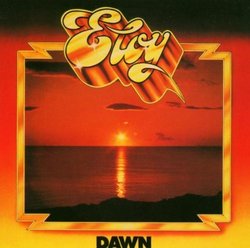A new "dawn" for Eloy
BENJAMIN MILER | Veneta, Oregon | 06/12/2004
(4 out of 5 stars)
"After Power and the Passion, the old lineup of Eloy broke up. The reason for that was there were disagreements amongst band members, some wanted the new concept album direction that guitarist/vocalist Frank Bornemann obviously wanted, and others didn't, preferring the old format of Inside and Floating. The other reason was they had a power-mad and overbearing manager (and producer) named Jay Partridge who didn't exactly make life for the band any easier. So apparently there were no tours in support for Power and the Passion. But given that album's moderate sales, EMI/Harvest gave Frank Bornemann a second chance to continue Eloy. So he found some local musicians in his hometown of Hannover, in this case drummer Jürgen Rosenthal (ex-Scorpions), bassist Klaus-Peter Matziol, and Detlev Schmidtchen, who at the time was more of a guitarist, but also a keyboardist. Dawn was the result of this new lineup. The production is vastly improved over their previous album. They also included an orchestra on some of the cuts (something the band won't do again until 1981 for their excellent album Planets). While the concept of Power and the Passion is pretty easy to follow, the lyrics to Dawn seems pretty indecipherable. "Awakening" starts off with the sound of thunder, orchestra, then eventually the music kicks in with acoustic guitar and vocals. "Between the Times" shows the band at their more rocking side. Here you hear a reference to Jeanne, Jamie's lover from the year 1358 that was the subject of their previous album. "Appearance of the Voice", "Return of the Voice" and "The Dance in Doubt" are most like their previous album with the extended use of vocal narrations. "The Sun Song" is the first cut you actually hear synthesizers, as the previous cuts, apparently demonstrated Detlev Smidtchen on second guitar. Here on this cut, you hear lots of string synths and Mini Moog, this demonstrates the Eloy sound for their next few albums. "Lost!? (Introduction)" is largely an instrumental with extended Moog solos. "Lost?? (The Decision)" starts off with Schmitchen playing a little excerpt from Bach's "Toccata and Fugue in D Minor", but then quickly the string synths kick in, same for Frank Bornemann's singing. "Gliding into Light and Knowledge" is a great, dramatic ballad that ends with "Le Reveil du Soleil/The Dawn". Here on this piece is a reference to Yes' Tales From Topographic Oceans where you hear a voice speak, "Nous Sommes du Soleil". Mainly it's Matziol's bass playing and Schimdtchen's string synth that dominated for the first couple minutes, with some nice wordless voice in the background. The whole band kicks in with a great Moog solo, before the orchestra closes the piece. The album isn't perfect, there are a couple pieces, like "The Midnight-Flight" and "The Victory of Mental Force" that seem to meander, sounding like this new lineup still was in need of a little more practice. To me, I find Ocean to be the better album (since the band had more experience in that one year period between albums). Still, an excellent album, even if I find Ocean and Silent Cries and Might Echoes to be better albums."
Good album by Eloy and a new lineup
Jeffrey J.Park | Massachusetts, USA | 08/28/2004
(4 out of 5 stars)
"This great 1976 album marks the first recorded performance with excellent drummer/lyricist Jurgen Rosenthal (he plays in a manner that is superficially similar to Neil Peart of Rush), keyboardist Detlev Schmidtchen, and bassist Klaus-Peter Matziol. This new lineup would go on to make some of Eloy's finest music of the 1970's including Ocean (1977) and Silent Cries and Mighty Echoes (1979). In addition to the new lineup, this album features new instrumentation including the occasional use of a string section, which had not been used on any recording made before Dawn and adds a softer, reflective contrast to the more rocking sections - especially when the rhythm section gets going full steam. Speaking of the rhythm section, Jurgen utilizes a very heavy technique that emphasizes fills on roto-toms and bottom kit playing, while solid bassist Klaus-Peter is mixed fairly high up in the mix with a punchy, trebly Gibson Thunderbird bass - he also used an Alembic but I don't think it's played on this album. One other characteristic feature of the music on this album is prominent use of the Hammond organ in addition to banks of spacey synthesizers including the mini-moog, string synthesizer (?), and the mellotron (with chorus setting) amongst others. Last but certainly not least we have bandleader Frank Bornemann on electric/acoustic guitar and lead vocals (he is occasionally accompanied by female backup singers). Although Bornemann is quite a good guitarist, folks have complained that his thick Germanic accent ruins the vocal passages. I have to admit that his accent does not bother me in the least - the music more than compensates for it.
All in all, this is an extraordinarily well-recorded, very energetic album that marks the beginning of a peak period for Eloy. Other albums that are highly recommended include Ocean (1977), Silent Cries and Mighty Echoes (1979), and perhaps the spaciest album in the Eloy catalog - Planets (1981)."


 Track Listings (10) - Disc #1
Track Listings (10) - Disc #1